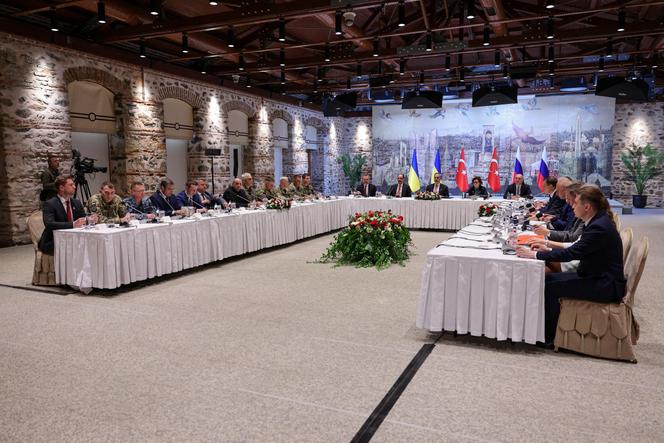


The first direct talks between Ukraine and Russia on ending their war in more than three years started on Friday, May 16, in Istanbul, with expectations low that the two sides would agree to end Europe's deadliest conflict since World War II.
Kyiv is seeking an "unconditional ceasefire" to the fighting, which has killed tens of thousands, destroyed large swathes of Ukraine and displaced millions of people. Moscow says it wants to address the "root causes" of the conflict and revive failed 2022 negotiations in which it made sweeping territorial and political demands of Ukraine.
Turkey's Foreign Minister Hakan Fidan opened the meeting around 1:35 pm local time in Istanbul's Dolmabahce Palace. He sat at the head of a table in front of Turkish, Russian and Ukrainian flags – with Russian and Ukrainian delegations facing each other, footage from the room showed. Hundreds of journalists were camped outside the palace.
Ukrainian President Volodymyr Zelensky called for "strong" Western action against Moscow, including new sanctions, if peace talks taking place in Istanbul fail to produce a breakthrough. "We had a real chance to take important steps toward ending this war if only Putin had not been afraid to come to Turkey," Zelensky told European leaders gathered in Tirana. "If it turns out that the Russian delegation really is just theatrical and can't deliver any results today... there needs to be a strong reaction, including sanctions against Russia's energy sector and banks," he said.
The two sides spent the 24 hours before the talks slinging insults at each other and Ukrainian President Volodymyr Zelensky accused Moscow of not being "serious" about peace. Nevertheless, the fact the meeting was taking place at all was a sign of movement, with both sides having come under intense pressure from Washington to open talks.
Russian President Vladimir Putin declined to travel to Turkey for the talks, which he had proposed, sending a second-level delegation instead. Zelensky criticized Russia for not taking the talks "seriously" by dispatching people who he said had no power to make decisions. Both Moscow and Washington have also talked up the need for a meeting between Putin and US President Donald Trump on the conflict. "Contacts between presidents Putin and Trump are extremely important in the context of the Ukrainian settlement," Kremlin spokesperson Dmitry Peskov told reporters Friday, adding that "a meeting is undoubtedly necessary." Trump had said Thursday that nothing would be settled until the two leaders met.
Ahead of the talks with Russia, Ukrainian officials held meetings with US Secretary of State Marco Rubio, Trump's special envoy Keith Kellogg and the national security advisors of Britain, France and Germany. Rubio "discussed the importance of seeking a peaceful end to the Russia-Ukraine war," and reiterated "the US position that the killing needs to stop," State Department spokesperson Tammy Bruce said.
Western leaders have criticized Putin for skipping the talks and sending his aide – a former cultural minister who is not seen as a key Kremlin decision-maker – Vladimir Medinsky. Rubio acknowledged that the Russian representation was "not at the levels we had hoped it would be at" and downplayed expectations for a breakthrough.
Russia's Medinsky led the failed 2022 talks with Ukraine at the start of the war, held right after Ukrainian forces pushed the Russian army away from Kyiv. He said Thursday that Moscow sees the talks as a "continuation" of talks that failed in 2022 – a sign that Moscow's hardline demands have not changed. But Medinsky pushed back against Zelensky's criticism and insisted that the Russian delegation has a mandate from Putin to "find possible solutions and points of contact." Russia has repeatedly said it will not discuss giving up any territory that its forces occupy. Kyiv's chief negotiator is Defence Minister Rustem Umerov, who has roots in Crimea, the peninsula annexed by Russia in 2014.
